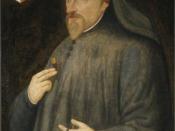Secularism: Eternally Growing
Literature, like other forms of art, is in some instances a conduit for the expression of an individual's religious belief. One author, Saint Augustine of Hippo, took that expression a step further in his autobiography Confessions by transposing his core, idiosyncratic faith onto the government and political establishment of the State. This idea of theocracy, where God is the supreme civil ruler, is not without an equally strong counterpoint, however. Secularism- the concept that a government should exist separately from religion and religious beliefs- has existed throughout history and can be read in works like Chaucer's The Canterbury Tales, Machiavelli's The Prince and Shakespeare's Measure for Measure. Although the secular world- the world separate from religion- has existed for as long as religion itself, its transparency and disclosure has gradually increased with time, as can be demonstrated by analyzing works prior to and during the Renaissance.
Secularism is not simply a term used to describe something "of this world" in relation to the opposition of religion, but is instead the name of one of the most important movements in the history of modern Western civilization. And although it wasn't until 1851 that British writer George Holyoake first used the word "secularism", the foundation of what secularism truly is was evident in what is now considered ancient history. Prior to and during the middle ages Christianity viewed the state as a necessary evil. According to the Church, the state served to uphold order and stability, but at its core was an institution that corrupted the citizenry and distracted them from their important duties to the Church and God. The Church was the primary moral and political institution and the state was expected to respect its power and be subordinate to its authority. Ultimately, the Church...


